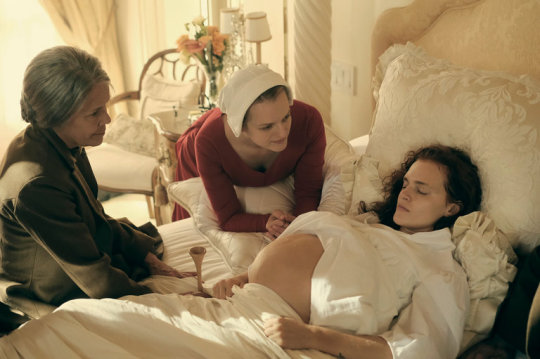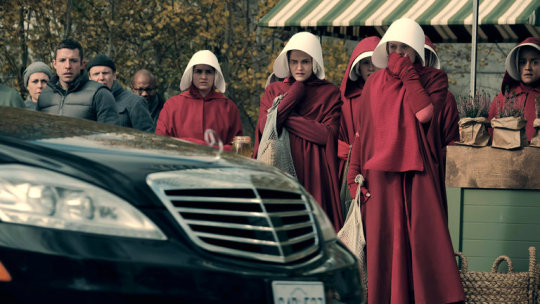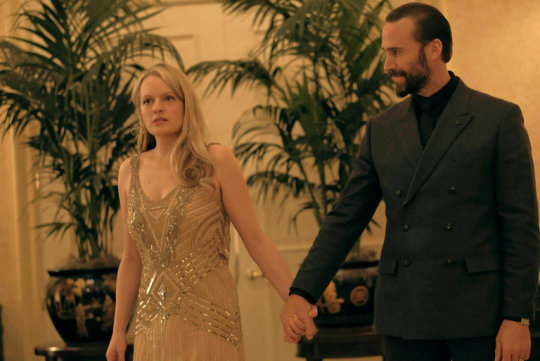#i should be writing about josé martí
Text
As the months creep into each other, Yuri starts letting you out of his sight more often. Not without watching you closely with SSS equipment unlawfully focused on you, but he just can't keep watching you waste away just in case you try sonething dangerous. At this point, if you decide to embark in treasonous business he will just make sure to stop you himself and do away with the evidence.
There's no particular reason for that.
You start dancing lessons because you miss dancing. You don't much like ostanian dances but you like your dance teacher. You tell Yuri all about how pretty she is, how strong her hands are when she guides you. Yuri sort of wants to have a little less than kind chat with her. But he doesn't. Partly due to a lack of opportunity and partly because you would go back to wasting away if he ruined this for you. He can't bring himself to.
Yuri also starts babysitting his niece more often. At first he keeps telling you about how she is the dumbest kid in the world. Then, slowly, he starts comparing her to Yor when she was a kid, and starts having short bursts of tenderness towards the kid. By the time he notices, he is already bringing her cookies and complaining about (but still watching) the spy propaganda she calls her favourite show. You want to meet the kid. Because she looks adorable in pictures and because you know she drives Yuri crazy and you want to high five her, befriend her maybe, plot against Yuri...
In any case, one unremarkable day, Yuri asks you about home.
He says "How was it? Your home I mean" you give a sigh, assaulted by a thousand memories of sunny days, cracked veredas, dirty streets and clean streets and trees lining all the sidewalks. You think about tilos, pines and jacarandás, lilac and magestic. You think about beaches and mountain lakes, you think about cumbias, reggaetons, traps, ballenatos, bachatas and you think about La gozadera. It tugs a teary smile out of you. There is so much you love and hate about home. You love the people, you hate the people, you despise the goverment, you love the biomes, you hate the sexist boys of when you were growing up, you love the women who enpowered you to want better, god, you miss the food.
"It was beautiful. The skies were always blue, except when it rained, obviously, but here it's almost always rainy or cloudy. Back home the skies were azure and spring smelt like life. I remember it better before the dictatorship. We used to go out clubbing with my friends, not that often cause we were all broke, but we would drink vodka and twerk all night, and go home clutching our keys between our fingers. We stopped going to parties when the dictatorship started. There were still a few, you know, but it became too risky."
"What's twerking?" You blush and give a little high pitched laugh.
"Uh, haha, its a sort of dance. You probably wouldn't like it. Reminds me of my best friend, she was the best dancer and the best friend I could ask for, she was really good at belly dancing, she tried to teach me but I never got past the basics. I hope she still sneaks around to parties, she always tried to get me to go with her, but I never dared. I'd do anything to have gone at least once, to listen to her screaming at me to divorce the movement of my hips from my torso. Did you know she's the one who taught me how to make coffee with spices? I feel so lost without her," you hang your head, spread the palm of your hand over your face. "she was bit like my mum." Yuri doesn't know what to say, so he goes for the first thing he picks out from your diatrive.
"I thought you didn't get along with your mum."
"We were complicated I guess. My mum grew up in the dictatorship before mine. She was obsessed with being descreet, with being so thin she'd disappear in the shadows, so perfect no one would question her. She tried to make me like that, partly because I never thought I would live through what she lived throuh but I don't think anyone could iron me straight. And by god she tried. My mum and my best friend, they were both obsessed with cleaning and perfect things. But my friend understood that I would never be perfect and still loved me. My mum, she could never accept me, but that's okay, because she would call me her 'bebita', her tiny big bebita and she would hug me very close when I cried. I wish I had told her something like 'te quiero mucho, mamita' the last time I went out her door. She must be so heartbroken to have lost yet another part of the family. " Yuri ponders about the families he has separated in the same way yours has been.
Finally he just says:
"I never really knew my parents. My sister raised me and she worked herself bloody at butchery to keep me fed and clothed and if I somehow found myself somewhere where I knew she didn't exist, I think I too would be heartbroken."
"Sometimes I wonder if I'm alive. Do you?" And Yuri thinks you are. You are the most alive thing in his house. You scream, you sing and cry and laugh and gather cats like a cat siren and you make so much noise it's impossible to confuse you for anything other than a living, breathing being.
"You are."
"I didn't mean me."
"Then, sometimes, I guess."
Yuri feels human when you get into this conersations.
"Yuri, I want to go out." You say, and your eyes say please, don't keep me prisoner. Yuri doesn't stand a chance.
"Get changed, I didn't want to cook anyways."
Part 2 Next Part
#yuri briar x reader#yuri briar#non traditional reader#reader is latina from an alternate latine reality#because i say so#spy x family#i should be writing about josé martí#mila if you see this no you didn't#but also tell me what you think#ily
94 notes
·
View notes
Photo

It all starts with a pause It’s probably been a bit too long now to make any excuses about work, but I’m back! As I write this, I’m sitting in pre-check-in the departure terminal of Norman Manley International Airport, waiting for my flight to open for check in. In the wake of the recent plane crash on a flight in Cuba, in which over 100 people tragically lost their lives, the domestic terminal of José Martí International has been temporarily closed. As far as I can tell, this means that all domestic flights are being re-routed to the two international terminals. As my flight to Havana takes a stop in Santiago de Cuba, my flight is delayed by 10 hours. As I’ve got so much time on my hands, I thought it would be a perfect time to return to my recently vacant blog. So, before I embark, allow me to tell you everything I’ve been up to recently. This semester has absolutely flown by. I’m not sure exactly why, but it’s felt like this whole semester could’ve fit into the first two weeks of the last one. I’ve become increasingly used to life in Jamaica, and I am sad to be departing (though, I wouldn’t exactly say a 10 hour extension of my stay has been much appreciated.) The real highlight of this semester for me has to be my trip to Portland along with my fellow internationals. We took a few days over the Easter weekend to explore what has to be my favourite part of Jamaica. We spent our days lounging on the beach (in Jamaica?! Surely not!) and our evenings swimming out to islands and building fires. I’ll never forget the view out over a sunset-kissed Caribbean from Monkey Island. Otherwise, this semester has been punctuated by the usual trips to beaches around Kingston and the assignments I’ve had to do here and there. (In case you’re curious, all went well as far as I can tell!) Throw in Carnival, a boat party, outings to take photos, and exams, and everything has gone by in a flash. Now I embark on what has literally been the journey of my dreams for the last three or four years. I’m heading first to Cuba, and then through Colombia, Peru, and Bolivia over the course of two months. It’s been a plan long in the making, and I can’t wait to make absolutely the most of it. I think that should really be it for now. I imagine I’ll report back again when I’m Colombia. Over the next couple of weeks I probably won’t be particularly responsive to messages, so don’t worry: I’m not dead, just living out my fantasies in Cuba. Until next time, Walk good. Freddy / Brumaica
2 notes
·
View notes
Link
Margaret Atwood’s rule for herself when writing “The Handmaid’s Tale” was that everything had to be based on some real-world antecedent. And she was able to combine disparate historical events in plausible — and horrific — ways.
Hulu’s TV adaptation of her novel does the same; even when the show expands the world established in the novel and adds scenes that weren’t in the original material, they “could have been, because they have precedents,” Atwood said in a phone interview. Ahead of the Season 1 finale on Wednesday, Atwood explained the historical basis of the book and the show’s most disconcerting elements.
Episode 1: Color-Coordinated Clothing

The women of Gilead all wear clothing and colors prescribed by their status in this society: red for handmaids, blue for wives, green for Marthas, brown for aunts. “Organizing people according to what they’re wearing — who should wear what and when, who has to cover up what — is a very, very, very, very old human vocation,” Atwood said. It dates back to the first known legal code, the Code of Hammurabi, one part of which stated that “only aristocratic ladies were allowed to wear veils,” she added.
“If you were caught wearing a veil, and if you were in fact a slave, the penalty was execution,” Atwood continued. “It meant that you were pretending to be someone that you were not.”
The handmaid’s garb comes from a variety of sources (mid-Victorian bonnets and veils, nun wimples). Atwood’s trip to Afghanistan in 1978 — where she wore a chador — was also an influence. “They weren’t imposing it on everybody, at that point,” she said. “They did later.” All of these codes of attire — including the Third Reich’s yellow stars for Jews and pink triangles for gays — were ways of “identifying people, controlling people,” she said. “It’s easy to see at once who this person is.” The handmaid’s assigned color, red, was used by Canada for its prisoners of war, Atwood added, “who had the privilege to wear because it shows up so very well in the snow.”
The red is also borrowed from Christian iconography of the late-medieval, early Renaissance period, she said, in which “the Virgin Mary would inevitably wear blue or blue-green, and Mary Magdalene would inevitably wear red.”
Episode 1: Mob Justice

Gilead likes its ceremonies, and it has one to punish political enemies or disruptive elements that also acts as a release for the otherwise tightly controlled handmaids. The women stand in a circle and collectively participate in an execution, in some cases by tearing the accused apart with their bare hands. In the novel, it is called a “particicution,” a portmanteau of the words participation and execution. “When the mob takes over, no one person is responsible,” Atwood said. And this kind of frenzied murder party has a very old precedent, she added, citing “the Dionysian revels of ancient Greece,” in which Maenads tore apart sacrificial victims for the god Dionysus.
The mob will sometimes demand justice. “During the French Revolution, Princesse de Lamballe was torn apart and had her head put on a pike, which was paraded under the window of Marie Antoinette,” Atwood said. “And in Émile Zola’s novel ‘Germinal,’ which is based on real-life 19th century coal-mining enterprises, the guy who runs the company store is exacting sex from the wives and daughters of the coal miners in order to sell them goods because they didn’t have any money. So when the women get the chance, they tear him apart, and put not his head but his genitalia on a pike, and parade it around.”
Episode 2: Forced Childbearing

We get an early peek at how ends justify means in Gilead when Janine gives birth and can’t accept the reality that she will not get to keep the child. “There are a lot of utopias and dystopias based on economics, but this is one that goes to the absolute root, which is how many people are you going to have?” Atwood said. “And how are you going to get them? In some cultures, you don’t have to make special laws about it. But in other cultures, you have to bring in oppression to get the results that you want.”
Tyrants and dictators like Adolf Hitler and Nicolae Ceausescu have often dictated the terms of fertility and criminalized those who did not comply. “It’s no accident that Napoleon banned abortion,” Atwood said. “He said exactly why he wanted offspring — for cannon fodder. Lovely!”
An added wrinkle, of course, is that the handmaids aren’t just being forced to give birth, they’re being forced to be surrogates, and the children they bear are then forcibly taken from them and placed with high-ranking officials. After a military junta took power in Argentina in 1976, as many as 500 young children and newborns were “disappeared,” only to be adopted by military and police couples. Hundreds of thousands of children of indigenous populations in Canada and Australia were separated from their families. “It must have been public in that it wasn’t a secret, but it also wasn’t known at the time,” Atwood said. “Nobody registered that this was happening. And it was probably presented like, ‘Oh, we’re giving these children a wonderful opportunity. We’re sending them to school.’ You see how that could sound?”
Episode 4: Declaring Women Barren

It’s not initially questioned in the show why women would be used to solve the fertility woes of the period — until Offred visits a doctor who offers to help her out. Turns out, the Republic of Gilead has never considered the other half of the equation: men.
“There’s some confusion about this, because here you have Aunt Lydia saying it’s the wives who are barren,” Atwood said. “And for centuries and centuries, that’s what people thought. They thought it was the woman’s fault.” King Henry VIII kept changing wives (and the state religion), Atwood noted, adding: “That’s why Anne Boleyn knew she was doomed when she had that miscarriage. The idea was that the child was fully formed inside the seed of the man, and his seed was simply planted in the woman, the way you’d plant a seed in a field.”
A book titled “Eve’s Seed: Biology, the Sexes, and the Course of History” by Robert S. McElvaine is illuminating on this front, she said. “You said a piece of land was barren, you said a woman was barren. You said a piece of land was fertile, you said a woman was fertile.���
In the show, the doctor knows otherwise. As does Serena Joy when she decides that Offred should use Nick. “That’s one of the things Anne Boleyn was accused of — having sex with her brother in order to produce a child,” Atwood said.
Episode 5: Why Ofglen Does What She Does

Ofglen has very few options once the resistance can no longer make use of her, and she opts for a last, desperate act of resistance, taking out a few guards with a stolen vehicle. It’s a departure from the book, but Atwood said she approved. “Do you remember the Buddhist monk who set himself on fire?” she asked. “José Martí, during the war with the Spanish, went into battle knowing he wouldn’t come out,” she continued, referring to the Cuban revolutionary who died in the Cuban War of Independence. “I think people do these things because otherwise they’ve been totally defeated. They know it’s not going to work in the present moment, but down the line, they are an example to others.”
Episode 6: The Mexican Ambassador

“The Hulu team made their Offred more active than my Offred,” Atwood said. “Partly because it’s a television series, and partly because it’s an American television series.” Offred would never have been able to stand up for herself or ask for help from a foreign emissary in the novel. The Mexican trade delegation visit doesn’t happen in the book. There is a scene in the novel in which Offred encounters some Japanese tourists, who she assumes are trade delegates, but she can’t honestly answer their pointed question, “Are you happy?” In the show, however, Offred speaks up to Ambassador Castillo when she has the opportunity — and she finds a way to get a note out to the outside world.
Atwood said ambassadors of neutral countries have often acted as conduits. In World War II, an Italian journalist named Curzio Malaparte reported from the Eastern Front, and he found a way to get out the news of what the Germans were really up to. “He was keeping these papers sewn into his coat and in the soles of his shoes and he smuggled them out through the diplomats of neutral countries,” Atwood said. “You have to trust people a lot to do that!”
Episode 8: The Black Market Club

Offred reunites with Moira at Jezebel’s, a brothel where powerful men go to conduct business and indulge in illicit sex and other escapades. It’s also a thriving black market for commoners and, more to the point, the Mayday resistance. Atwood said she was rereading a book by Norman Lewis, “Naples ’44,” which describes the black market that was tolerated by the Allies in Naples, Italy, during World War II “because they were helping to run it!”
“All of this stuff is so old,” she continued, “black markets, special clubs with items you can’t get elsewhere, information exchanged through subterranean conduits.”
In the Audible special edition of “The Handmaid’s Tale,” listeners learn that there is actually a chain of Jezebel brothels, some with golf courses. “Because of course women could no longer play golf,” Atwood said. “This has actually been a complaint of female politicians, that all these special deals and secret conversations and understandings are reached at golf clubs, and if you don’t play golf, you’re just out of it.”
Episode 9: The Mayday Resistance

Atwood did a huge amount of research on the resistance movements in various countries during World War II. One of her old friends, now deceased, was a member of the French Resistance, and he parachuted behind enemy lines to help funnel downed British airmen out of France. “His job was to interview them, to make sure they were really British, not Germans pretending to be British in order to reveal the underground lines of communication,” she said. “So they would ask about where they came from, football scores and such, and if you figured out that they were really German, they were shot. Just like that.”
She also met members of the Polish and Dutch resistance movements. “The people I met, of course, were the people who made it through,” she said. “Many others did not.” As evidence, she cited the members of the White Rose, who were caught distributing anti-Nazi papers and executed, and the female British spies who sometimes doubled as assassins. Using female agents, Atwood said, has been a tactic employed by resistance movements and Islamic extremists, and the handmaids’ outfits make them especially well suited for keeping secrets. “Just look at all the places where you could hide things!” she said, laughing. “Big sleeves! Tuck it in your stocking. Nobody’s going to look.”
49 notes
·
View notes
Text
The Cuban Animation Industry and it’s History
My overall time with my research project truly showed that there was so much more to the animation industry in Cuba than I could have ever imagined. Of course yes there were propaganda films and the like where the cartoons went parallel to the interests of the Cuban revolution and their ideals, but their animation industry is so much more than that and continues to make progress creating beautiful work.
It should be noted that Juan Padrón is the only animation figure to have been extensively covered in academic writings as well as in general animation forums due to his involvement in directing Vampires in Havana. Besides that many animators are merely mentioned by name and what they worked on might have been mentioned by title.
But besides that I truly wish there had been more information about the industry, which most likely is archived or lost in some building due to Fidel’s influence on the country’s history. What I was able to find pleasantly surprised me and generally satisfied my curiosity, I’m glad to know not EVERYTHING coming out of their animation departments were propaganda films. It was actually really nice knowing they adapted some of José Martí ‘s writing into something children were able to understand visually in order to understand his writing. As well as learning exactly what pushed the country to begin producing it’s own cartoons for their children in the 70s, which was a direct push against having American and/or European cartoons that belittled their people and instead had cartoons that celebrated the Cuban culture.
Just all of the information I was able to gather was so nice, and I’m extremely happy with the result of everything I found.
0 notes